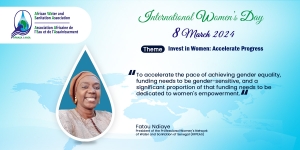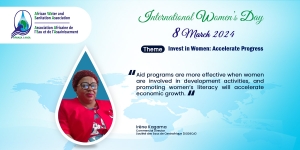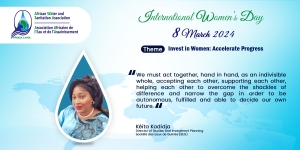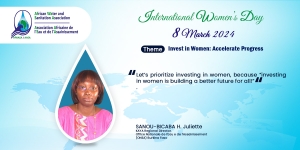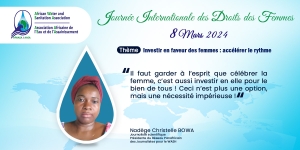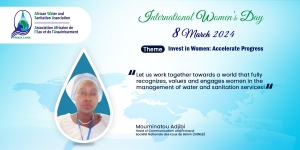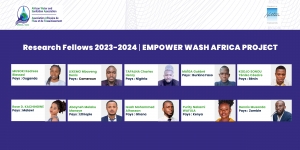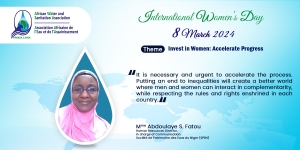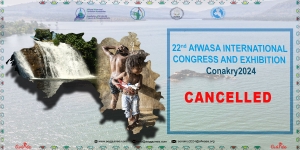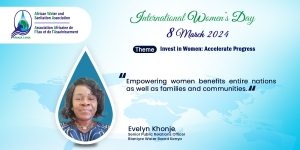Nzickonan Stéphanie
IWD2024: Statement by the President of the Network of Women Water and Sanitation of Senegal
In a world moving at the speed of political, economic, social, environmental and geostrategic change, women have had their long march. Conquests and new challenges punctuate this ordeal towards greater empowerment. We have come a long way since March 8, 1957! So many battles have been won to bring us to the International Women's Day again this year. The purpose of this commemoration is not to ratify yet another celebration or to let legitimate ambitions fall into oblivion. Rather, its vocation lies in the sowing of innovative ideas and the impetus of a transformative force to qualitatively change the daily lives of wives, sisters, friends, mothers, grandmothers, daughters and collaborators. Let us simply see the greatness of the Woman in all these emblematic figures of our daily lives, whom the present and posterity have a duty to celebrate as vectors of well-being for communities!
The fate of women calls into question the principles of a democratic society in which everyone aspires to equal opportunities. In this respect, we have come a long way. This journey is the mirror of our successes and of the constraints to be lifted. Steps have been taken towards gender equality or, at the very least, an improvement in the status of women. Our intention is not to promote a male-female opposition, which would be counterproductive in the co-construction of a space of excellence conducive to the fulfillment of all. Indeed, we applaud the results achieved in the fight for women's rights. An analysis of the logbook shows that, today more than ever, there are still significant steps to be taken to empower women and enable them to:
-
Reduce the arduousness of the tasks entrusted to them within the family and society;
-
Have income-generating activities;
-
Have free time to look after their families;
-
Or allow their daughters to have the right to the best education.
Executive and legislative powers are also called upon, as they formulate the laws that govern our daily actions. It is clear that the concerns mentioned above are all markers on the road to greater recognition of women's rights. Indeed, today, more than ever, investing in women's empowerment is an absolute necessity. It is the royal road to enable those who do not have a salaried job, those who are not educated, to get even further ahead. Certainly, efforts have been made or are in the process of being made. However, it is imperative that the pace be stepped up, so that giant strides can be made in the quest for equality or, at the very least, equity. Serving women means taking care of society. Progress in empowering women will benefit the family first and, to a greater extent, society as a whole. Ultimately, empowerment will reduce poverty.
There is still a long way to go. The right tempo for the right cause. This justifies the apt use of the word "accelerate". To accelerate the pace of achieving gender equality, funding needs to be gender-sensitive, and a significant proportion of that funding needs to be dedicated to women's empowerment.
Bastions have been conquered in the area of wage taxation here, or parental authority elsewhere. We have to admit, however, that resistance is still emerging, strengthened by psychological and sociological barriers that stand in the way. For example, women are fighting for access to land. Unfortunately, when they do have access to land, they still use the old methods of cultivation, which can certainly generate income if the necessary equipment is installed. In this case, they will be able to sow larger areas, have bigger harvests, more income and more free time to take care of their families and enable their daughters to go to school and be better educated. This is the virtuous circle that multiplies and regenerates the ambition that will take women to the heart of economic initiatives and to the pinnacle of political and social success.
Today, more than ever, there is an urgent need to invest in women's empowerment. This investment, more than a necessity, is becoming a human right and a means of putting an end to the poverty that is slowing down any process of social, economic and political emancipation.
We still have a long way to go. However, we, women, must not give up the fight for gender equality. Our fight must be permanent, and the results must benefit the family and society. The income generated must not be squandered on ceremonies, but must rather enable women to become increasingly emancipated.
This is the royal road to promoting models of women freed from all social yokes and prejudices of inability to say, do and succeed. It is a way of showcasing women's skills on a permanent basis and beyond.
Ms. Fatou NDIAYE
IWD2024: Statement by the President of the Central African Network of Women Water and Sanitation Professionals
Far from being a distorted commercial event, the International Women’s Day is an important date saved in the feminist calendar, with the aim of denouncing the discrimination, inequality and abuse experienced by women. It is a time for reflection and the search for solutions to improve the situation of every woman, while highlighting the progress that has been made.
In line with this year’s theme, we need to promote gender equality in economic and social spheres, in infrastructure, access to credit & finance, and agriculture. Education is one of the ways in which the emancipation of women can be achieved.
Aid programs are more effective when women are involved in development activities, and promoting women’s literacy will accelerate economic growth.
Furthermore, instructing a woman is educating a nation. In other words, providing instruction to girls is the best investment in development that a country can make. To build a better future, let’s invest in women and girls.
IWD2024: Statement by the President of the Network of Guinean Women Water and Sanitation Professionals
On the threshold of International Women’s Day, to be celebrated on 8 March 2024, I would like to invite all women in Africa, America, Europe, Asia and Oceania, mainly those in the water and sanitation sectors and working in member companies of the African Water and Sanitation Association (AfWASA), to celebrate it not as a day of celebration but rather as one of awakening and questioning.
Although some progress has been made since 1975, there is still a long way to go to reduce gender gaps.
There’s hope, you just have to believe it, because with courage, commitment, self-denial, perseverance and support, we’ll make it.
We’ll make it happen by building on what we’ve already achieved and drawing inspiration from successful female role models (entrepreneurs, managers, researchers, etc.).
We must act together, hand in hand, as an indivisible whole, accepting each other, supporting each other, helping each other to overcome the shackles of difference and narrow the gap in order to be autonomous, fulfilled and able to decide our own future.
“Women, all together, we can unlock our inner potential and change the world.”
IWD2024: Statement by the President of the Women Water and Sanitation Professionals of Burkina Faso
As we celebrate International Women’s Day, I would like to take this opportunity, on behalf of the Network of Professional Women involved in Water, Environment and Sanitation sector of Burkina Faso (RFPEEA-BF), to pay tribute to the resilience and fighting spirit of women throughout the world in general and particularly in Africa and to call for greater action and investment on their behalf.
Water is the source of life; it is also source of happiness and fulfilment for mothers, daughters, women and society as a whole.
We can therefore assert that investing in mobilizing and treating water resources and promoting/implementing sanitation facilities for a healthy environment is an investment in the development of women and the well-being of society.
Many of these women are already fully committed to keeping their families in balance: not only do they fetch water, but they don’t hesitate to use their small earnings in a variety of activities where they thrive. These activities should therefore be supported with much more investment to turn them into income-generating activities that can potentially be transformed into development projects.
Burkina Faso is currently experiencing a marked deterioration in security conditions in several areas, leading to massive internal migrations, mostly of women and children. This has led to disorientation, disarray, insecurity, poverty and so on.
In this difficult context, almost all development sectors are under high pressure, including particularly the water, environment and sanitation sector.
In 2024, in addition to our regular awareness-raising and advocacy activities to promote women’s access to water and sanitation services, we, professional women involved in the water, environment and sanitation sector in Burkina Faso, resolved to support women in difficult situations by implementing a project aimed at creating a market garden to promote organic market gardening on a plot of one (01) hectare that could be extended.
This fledgling project, with an initial budget of CFAF five million (5,000,000), aims to improve the living conditions of the population, notably for fifty (50) women and girls directly. It will contribute to the employment of women, to the development of their skills and to supporting them in a process of empowerment so that they can provide for their own needs and those of their families.
This initiative is the result of the provision of land and a water point by the National Water and Sanitation Board (ONEA) and financial support from the AfWASA covering training, the purchase of equipment and seeds, etc.
Convinced that initiatives, large and small, that contribute to the empowerment of women make all the difference, we, the women of RFPEEA-BF, are launching this heartfelt appeal: let’s prioritize investing in women, because “investing in women is building a better future for all!”
IWD2024: Statement by the President of the Pan-African Network of WASH Journalists
Celebrating women also means investing in them for the benefit of all!
This has turned into a tradition now! Every year on March 8, the world takes a break to “celebrate” women. The 2024 is no exception to this rule established by the United Nations Resolution 32/142 adopted on 16 December 1977, which instituted the International Women’s Day (IWD). Although its origins go further back than that, there is no need to recall here the historical context of this day. Beyond the celebrations and parades marking that day, the activities organised around it generally focus on the need to create favourable conditions for the full development of women and their participation in the life of humanity. It is also a moment to take stock of equal opportunities for men and women in different countries.
By deciding to look at the “glass as half full”, we notice notable progress since the first claims that led to this Day being instituted with its relevant goals. A succession of concepts have been developed to give a real value to women, who are increasingly found in business sectors that only a few years ago would have been unimaginable, in decision-making circles and so on, even if their number remains limited.
We refuse to turn back the clock and take up the struggles that have enabled women to achieve a higher standard in a sphere that was previously reserved for men, simply because the challenges have not been exhausted! While many people, after arguments and awareness-raising efforts, are beginning to have a different perception of the role of women in the development of a nation, of a society, starting by the family circle, the task remains demanding. To have a real impact, actions require resources, however limited.
The theme of this year, “Investing in Women to Accelerate Progress”, is an apt illustration of the message we want to convey. The world is changing. In many countries, conflicts, economic instability and climate change, as a major concern, create a humanitarian situation that affects women to a greater extent than men.
Contrary to previous years, women are more aware that they can effectively contribute to creating a better world. They have numerous solutions that are just waiting to emerge. However, most of the time, they face a huge obstacle: investment! Empowerment! Gender equality is not the issue. Men and women will never be equal. The game is already rigged in terms of physiology. As women, we face realities that men don’t and vice-versa!
The issue is equality in terms of rights: the right to quality education; the right to funding for the implementation of projects or start-ups led by women; and many other rights such as access to land which are not mentioned here. In this area, the process is slow. Where legislation does exist, it is certainly “regardless of gender”, but most of the time it is “stagnant”, due to a lack of monitoring or a lack of proper monitoring.
“Investing in Women to Accelerate Progress” is more than just a call to action. For us, it is a call to move beyond the traditional scientific sessions, seminars and panels organised on this occasion, and take action to implement the resolutions and other ensuing recommendations.
Some progress has been made, but we need to move faster, if we want to avoid losing what we have already achieved! Everything needs analysed from a gender perspective! That means integrating specific characteristics more than we did in the past! The International Women’s Day is an opportunity to celebrate women and their economic, political and social achievements. However, we must keep in mind that celebrating women also means investing in them for the benefit of all! This is no longer an option, but an absolute necessity!
WID2024: Statement by the President of the Beninese Network of Women Water and Sanitation Professionals
On this International Women’s Day 2024, as the world recollects the critical importance of investing in women’s empowerment and promoting gender equality at all levels of society, we feel even more compelled to work harder to fully realize our rights.
Investing in women’s empowerment must be a priority, especially in a world where the proportion of women is increasing. This means building women’s capacity, giving them access to education, economic and political opportunities, safety and decision-making in all aspects of life. When women are empowered, communities and nations thrive.
Furthermore, promoting gender equality in the water and sanitation sector offers concrete solutions for all stakeholders, especially women, not only by improving the effectiveness and sustainability of projects, but also by reducing poverty, building community resilience and promoting sustainable development.
So, let us work together towards a world that fully recognizes, values and engages women in the management of water and sanitation services!
Mouminatou ADJIBI
Congratulations to our lucky winners!
AfWASA is pleased to present the selected Research Fellows for EMPOWER WASH Africa Program
The African Water and Sanitation Association (AfWASA), with the support of the Conrad N. Hilton Foundation (CNHF), are implementing a program entitled "Empowered WASH Systems at District-level in Africa (EMPOWERWASH-Africa).” This program aims at (i)supporting better understanding by AfWASA of WASH systems at district level so to identify the gaps and challenges to improve the performance of service delivery, ii) improving WASH systems at district level throughout knowledge and best practice sharing by the means of peer-to-peer learning approach and iii) supporting the creation of new knowledge and dissemination of best practices through the small grant and Community of Practitioners (CoPs).
It is in that regard the AfWASA is awarding research scholarships to ten (10) African Young Water and Sanitation Professionals. Target beneficiaries are undergraduate, and masters’ students as well as engineers in the final year of their training. Each scholarship, with a maximum value of USD 1,000 (one thousand US dollars), will make it possible to conduct research work sanctioned by a scientific report on a theme related to the WASH in Rural areas.
On the occasion of International Women's Rights Day, AfWASA celebrates the dynamism and commitment of the women of its network
In recent decades, significant progress has been made in advancing women's rights. In our country, a ministry is responsible for managing gender issues, and several non-governmental organizations support women in asserting their legal rights. This provides an ideal framework for women to pursue their goals.
Achieving gender equality is a complex issue that requires consideration of various social, cultural, and environmental factors. Despite these challenges, it is important to accelerate progress towards women's empowerment and equal rights. Despite these challenges, it is important to accelerate progress towards women's empowerment and equal rights. Despite these challenges, it is important to accelerate progress towards women's empowerment and equal rights. By raising awareness, we can overcome these obstacles.
Women must cultivate gender solidarity, converging towards a common cause: the fight for equal rights and empowerment.
It is necessary and urgent to accelerate this process in 2024. Putting an end to inequalities will create a better world where men and women can interact in complementarity, while respecting the rules and rights enshrined in each country.
The 22nd AfWASA International Congress and Exhibition Conakry2024 has been cancelled
Dear Members and Friends,
We deeply regret to inform you that our 22nd International Congress and Exhibition, initially scheduled from February 18 to 22, 2024 in Conakry, Republic of Guinea, is cancelled for reasons of force majeure relating to an explosion that occurred in a fuel depot in Conakry, during the night of December 17 to 18, 2023.
Given the situation, the Government of the Republic of Guinea, through the Minister of Energy, Hydraulics and Hydrocarbons, officially requested AfWASA on January 2, 2024, to postpone the event.
On January 9, 2024, AfWASA Executive Board, in collaboration with Société des Eaux de Guinée (SEG), the local organizer of the Congress, sent a mission to Guinea to meet the authorities and assess the situation. Following this mission, it was concluded that it was impossible to organize such a large-scale event this year, leading to its outright cancellation.
We sincerely apologize to our members, partners, and friends for any inconvenience this cancellation may cause and look forward to seeing you at our next Congress, scheduled from February 17-20, 2025 in Kampala, Uganda.
Thank you very much for your understanding.
The Executive Director
Olivier GOSSO
AfWASA is celebrating women in the water and sanitation sector
Women make up half of the world's population and to fully realize human potential, they must be fully involved in all facets of society. Not only is it morally required to invest in women's empowerment and gender equality, but it is also strategically necessary to promote sustainable development and advance global progress.
Empowering women benefits entire nations as well as families and communities. When given equal opportunities in leadership, employment, and education, women significantly contribute to social stability, economic prosperity, and innovation. Numerous studies show that empowering women enhances their general well-being, lowers poverty, and improves their health and education. At Blantyre Water Board in Malawi, through the “Sustaining the Flow of Lide and Development (SLD) Program, there are deliberate plans to empower women for taking up leadership positions to reduce the gender inequality.
As the world commemorates the 2024 International Women’s Day, I implore on governments, organizations and communities to direct their focus on investing in women for accelerated progress in development projects. Women are frequently at the forefront of developmental projects such as community development and environmental preservation. Women who are economically and socially empowered are better able to support sustainable development and environmental preservation.
Gender equality is a fundamental human right for all and not just a problem for women. Equal opportunity and treatment should be given to all people, regardless of their gender. Society can unleash the potential and abilities of its whole populace and promote inclusivity and diversity by eliminating gender-based discrimination.
Beyond the scope of society, gender equality is a cross-cutting issue that expedites progress across all development objectives, from eradicating poverty to advancing high-quality education.

 English
English  Français
Français 
